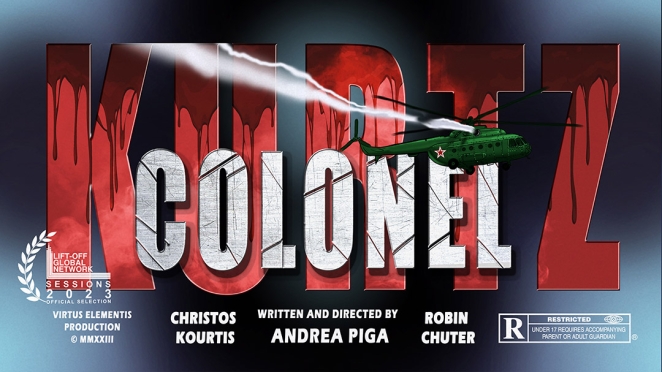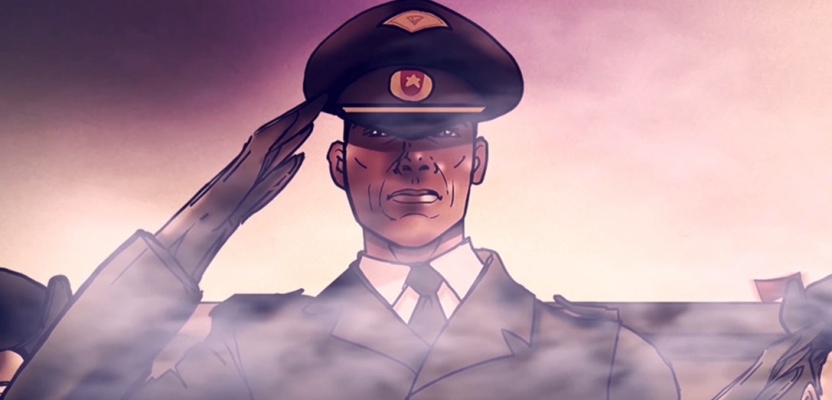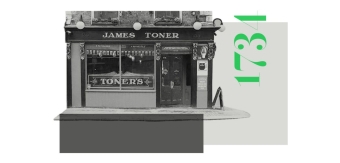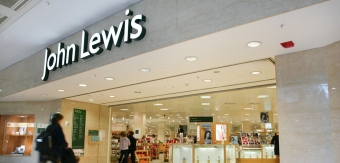How did you get into the industry?
After Uni, I worked a bit as an editorial illustrator for some sports magazines in Milan, when illustrators were still painting with brushes on paper - but was not the ideal scenario for me as I have always been fascinated by illustration for film production, specifically storyboarding for TVC.
I remember looking at some amazing layouts executed with round brushes on paper by a master of illustration back in Milan, which someone at an AD agency gifted me. Those illustrations were amazing: very few constructions lines, splash of colours creating silhouettes of bodies coming out the paper from sketched architectural background, perfect anatomical proportions and gorgeous facial expressions of models.
Due to lack of opportunities and probably lack of skillsets in that period, I switched into sales/marketing work for a few years, which has been fundamental for braking later into the illustration/storyboarding business. When I felt it was time to switch back, I prepared a storyboard portfolio from scratch and I started approaching film production companies in UK, EU and US for storyboard work until someone has replied: “Yes, we need a storyboard can you pop by tomorrow…?”
Storyboarding is about problem solving and selling ideas, convincing people through your illustrations that what they see is going to work. In a way is about teasing the viewer, overcoming objections by exploring multiple solutions when the idea is just based on a few words, and sometimes defending your ideas/executions because very often the ones who pay for your illustrations they know very little about Art history, anatomy, body language, memorable films shots in movies, period costumes, architecture, design, cars, etc..
Where are you based now and who do you work for?
I work in London as a Storyboard Artist for the film/TV industry, developing visualisation treatments for TVC, branded content, music video, animation, Immersive, TV programme pitch and any media content which requires an effective visual storytelling assistance.
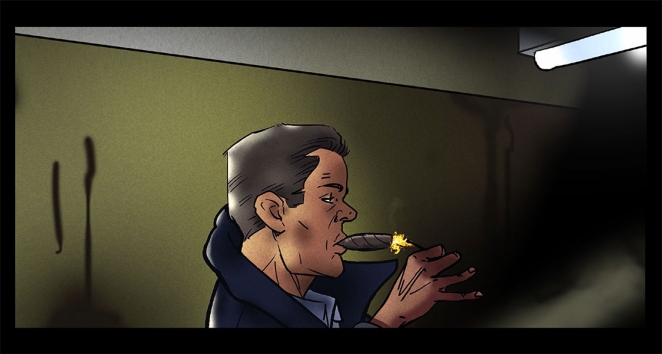
Clients in UK, EU and US include AD & PR agencies, film production companies, animation/VFX /Design studios, broadcasters, streaming platforms, music label and brands: Automotive, Beverage, Charity, E-commerce, Entertainment, Fashion & Beauty, FMCG, Gaming, Music, Pharma and Sport. ]
If you weren’t in your current industry, what would you be doing?
I would be still in Sales and Marketing, which is a great field to interact effectively with people providing solutions - even a creative work has to be pitched/sold/presented, and without good communication skills and a reasonable attitude/approach is hard to find new clients for developing further your portfolio.
Can you explain your creative process? What makes it unique?
This is very mysterious and still I am not able to master it…Sometimes drawing just very few lines I am able to execute what I wanted to achieve, and it happens very quickly – in other circumstances I can spend hours performing the same action but without achieving what I was looking for – In this case I skip to the next panel/shot/drawing and I come back later.
The good work usually comes out at a very high speed, while over thinking makes the illustration a bit too stiff and predictable.
How would you describe your style?
I find a bit pretentious to define “my style” and I would rather describe my approach.
As a commercial illustrator/storyboarder, I am paid to draw what other people want to see. Listening and researching is fundamental for any other consultancy, marketing, or sales job - I would compare a good illustrator to an actor, who is able to interpret various scripts: from the most hilarious comedy sketch to the most frightening performance on stage.
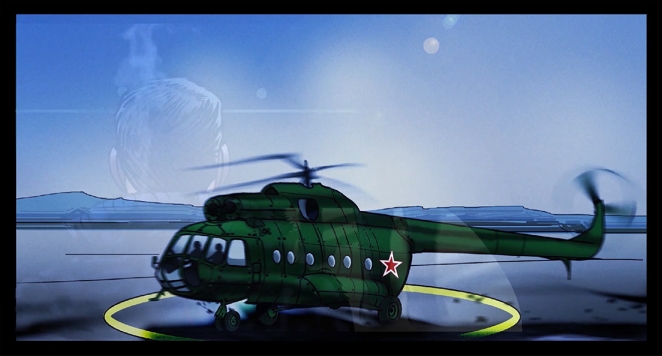
As a pro illustrator you can expect to illustrate animation for a kid’s audience, which has to be joyful, friendly and welcoming in terms of visual language - to the most splatter, gritty and dark shot, which you can easily find in any contemporary series on streaming platform.
As a visual artist is very important to be open to experiment new technique, software, and processes, even if the initial results might look a bit disappointing… sometimes happy accidents happen along the way of creating stuff, letting you discover new tricks and mix -media technique.
Which individuals do you gain inspiration from? Do you have any heroes in the industry?
The masters of golden age American illustration Norman Rockwell, Frank Frazetta then all the Comics artist legends in Italy and France like Hugo Pratt, Ferec Pinter, Moebius, Milo Manara, Guido Crepax, Philippe Druillet, Uderzo, Tanino Liberatore then HR Giger, Richard Corben, Hajime Sorayama, Frank Miller, Jamie Hewlett and Robert Valley.
Animation: Akira by Otomo, Hanna & Barbera toons, Warner toons, Heavy Metal (film and magazine), Ghost in The Shell, Cool World, and recently Blue Eyes Samurai on Netflix.
Film directors: Akira Kurosawa, Alfred Hitchcock, Michelangelo Antonioni, Martin Scorsese, Francis Ford Coppola, Sergio Leone, Stanley Kubrick, Ridley Scott, William Friedkin, Quentin Tarantino, Satoshi Kon, Coen Bros, David Fincher, Alex Garland and Stefano Sollima.
Photography: Mapplethorpe, Irving Penn, Richard Avedon, Helmut Newton, Mario Testino.
Fashion Illustrators: Rene Gruau, Jean Paul Goude, Mats Gustafson and David Downtown.
Fashion-Style: Vivienne Westwood, Paco Rabanne, Armani, Moschino, John Galliano
Design: Mies Van De Rohe, Bruno Munari, Philippe Stark, Luca Bassanini. Syd Mead.
Architecture: Henry Van De Velde, Le Corbusier, Frank Lloyd Wright, Santiago Calatrava and Renzo Piano.
Advertising: Levi’s TVCs of the ’80s--’90 s by BBH London is my favourite.
What tips would you give to aspiring creatives looking for work?
Trying to show off your work as much as possible - sometimes is very frustrating because is not pleasant reaching out and getting no feedback – however statistically 1% only of your prospect might come back to you sooner or later ...so the effort and work to put on the table is huge and sometimes painful, be aware!
What tips would you give to other professionals to get more clients?
Again, as in marketing it’s a numbers game, the more you get out the more you might get.
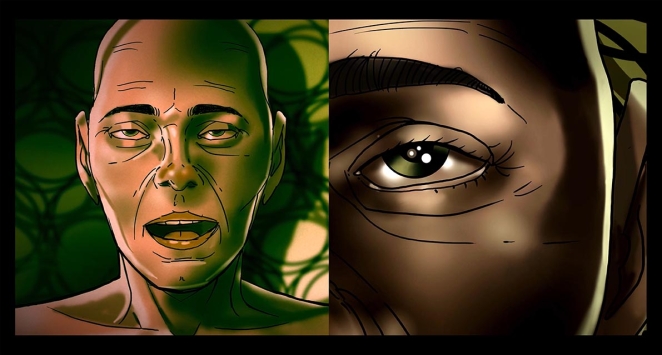
Combining personal research on new companies/people to approach, social media, professional associations lists, e-mail marketing and new trends in the industry which might require your skills.
What kind of tools/kit/software could you not do without?
I always bring with me my iPad pro for drawing and animating on Procreate.
What’s your secret to staying inspired and motivated?
It’s tricky especially working as a storyboard artist, you never know when the call will come for the next job - unfortunately this business is always extremely volatile and unpredictable and for some reasons most of the times is last minute call based.
Working on personal projects might help to staying motivated and learn new technique, while you are waiting for the next commission/contract
What’s the work achievement you’re most proud of?
I executed storyboard transferred into TVCs for TV or web, promo for live entertainment shows broadcasted on BBC, music video that collected millions of hits on YouTube, opening sequence for a Netflix series, top-secret B2B pitch concepts for to top key government personnels … however the work achievement I am most proud of it is my first short animated movie, which I wrote, directed, animated and produced.
The initial idea was to produce a long form spy/espionage graphic novel saga involving a global network of spies on daring missions around the world … but the project has evolved into an animation, which I have never ever done before - considering all the aspects involved into the production: from writing a script, concepting the character design, animating and directing the movie, it was really challenging and fun - I hope it will bring to a sequel/development.
What is the one thing that you would change about the industry?
In my specific field: storyboard for film, TVC and beyond the bookings of illustrators are often dealt on a last-minute basis – or even worse the producers of agencies and film production companies request availability before actually they are in a position to confirm a date, which is pure nonsense because pro illustrators do not own a crystal ball to predict the future in case a “real instant booking” comes in from another client immediately after.
I reckon in the industry there is a lack of assertiveness – if you are solution/services provider for blue chip brands “you have to dictate the pace to clients” having a chain of creators/suppliers to coordinate, instead of waiting for an executive (who are paid to make decisions) to say...yes let’s do it!
Any websites, books or resources you would recommend?
I would recommend to go to my heroes I mentioned earlier by doing a bit of research on their names – I hope it will be inspiring for the creators reading my interview.
